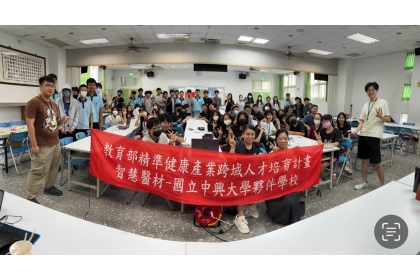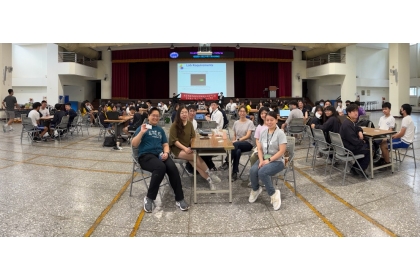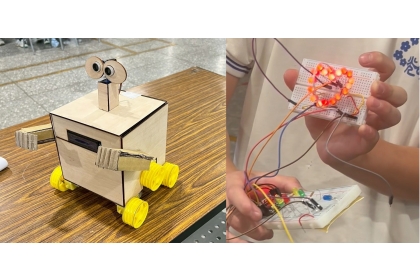NCHU Partners with Junior High Schools to Promote Smart Medical Technology Education: A Model for Youth Talent Cultivation and Social Responsibility
2025-06-09
興新聞張貼者
Unit秘書室
168
Biomedical Engineering (co-PI of the Ministry of Education's Smart Medical Materials Program) and Professor Hui-Yu Chen from the Department of Physics at National Chung Hsing University (NCHU) organized a hands-on STEM activity titled "Play with Circuits: Light Up Your First LED with Programming!" at Taichung Municipal Chu-Jen Junior High School (居仁國中) and Kuang-Ming Junior High School (光明國中). A total of 450 ninth-grade students participated, gaining firsthand experience with basic electronics, LEDs, and programming, while exploring the foundations of embedded systems and smart medical technologies.
This outreach activity was sponsored by the Ministry of Education’s 2025 “Precision Health Industry Interdisciplinary Talent Cultivation Program” under the Smart Medical Devices division, led by Dean Ming-Der Yang of NCHU. One of the program’s core courses, Advanced Smart Diagnostic Technologies, focuses on training students in the practical application of ESP32-based embedded systems in the context of smart healthcare. As part of their final project, participating undergraduate and graduate students volunteered as “seed teaching assistants (TAs),” engaging with local junior high schools to implement collaborative, hands-on instruction and social outreach.
During the workshops, the seed TAs guided junior high students in operating Wifiboy or ESP32 microcontrollers, writing MicroPython code to control LED lights—adjusting brightness and blinking patterns—demonstrating the integration of coding and circuitry. In addition, they showcased ESP32-based devices for blood oxygen and heart rate detection, as well as a “WALL-E robot” equipped with ultrasonic sensors for obstacle avoidance. These demonstrations offered students a glimpse into real-world applications of smart medical devices.
A total of 17 NCHU students participated as teaching assistants, including:
• Graduate Institute of Biomedical Engineering: Chen Kuan-Lin, Tsai Cheng-Feng, Chan Huai-Che, Wang Ching-Wei, Liao Yi-Ching, and Huang Yi-Nuo
• Department of Physics: Lai Cheng-Yu, Liao Chun-Kai, Sung Chien-Yeh, Wang Cheng-Jui, Hsueh Wei-Chung, and Wu I-Chen
• Undergraduate Program in Biotechnology: Tseng Yi-Hsuan, Liu Yu-Heng, and Pan Feng-Yo
• Department of Bio-Industrial Mechatronics Engineering: Chiu Po-Chun
• Creative Engineering Program: Hsieh Hsin-Lun
Through this initiative, students not only applied their technical knowledge in real-world settings but also embraced their roles as contributors to community engagement and service learning.
For more coverage of the event, please visit Kuang-Ming Junior High School's official Facebook post:
https://www.facebook.com/share/v/16M9eXAbJ1/?mibextid=wwXIfr
This outreach activity was sponsored by the Ministry of Education’s 2025 “Precision Health Industry Interdisciplinary Talent Cultivation Program” under the Smart Medical Devices division, led by Dean Ming-Der Yang of NCHU. One of the program’s core courses, Advanced Smart Diagnostic Technologies, focuses on training students in the practical application of ESP32-based embedded systems in the context of smart healthcare. As part of their final project, participating undergraduate and graduate students volunteered as “seed teaching assistants (TAs),” engaging with local junior high schools to implement collaborative, hands-on instruction and social outreach.
During the workshops, the seed TAs guided junior high students in operating Wifiboy or ESP32 microcontrollers, writing MicroPython code to control LED lights—adjusting brightness and blinking patterns—demonstrating the integration of coding and circuitry. In addition, they showcased ESP32-based devices for blood oxygen and heart rate detection, as well as a “WALL-E robot” equipped with ultrasonic sensors for obstacle avoidance. These demonstrations offered students a glimpse into real-world applications of smart medical devices.
A total of 17 NCHU students participated as teaching assistants, including:
• Graduate Institute of Biomedical Engineering: Chen Kuan-Lin, Tsai Cheng-Feng, Chan Huai-Che, Wang Ching-Wei, Liao Yi-Ching, and Huang Yi-Nuo
• Department of Physics: Lai Cheng-Yu, Liao Chun-Kai, Sung Chien-Yeh, Wang Cheng-Jui, Hsueh Wei-Chung, and Wu I-Chen
• Undergraduate Program in Biotechnology: Tseng Yi-Hsuan, Liu Yu-Heng, and Pan Feng-Yo
• Department of Bio-Industrial Mechatronics Engineering: Chiu Po-Chun
• Creative Engineering Program: Hsieh Hsin-Lun
Through this initiative, students not only applied their technical knowledge in real-world settings but also embraced their roles as contributors to community engagement and service learning.
For more coverage of the event, please visit Kuang-Ming Junior High School's official Facebook post:
https://www.facebook.com/share/v/16M9eXAbJ1/?mibextid=wwXIfr




